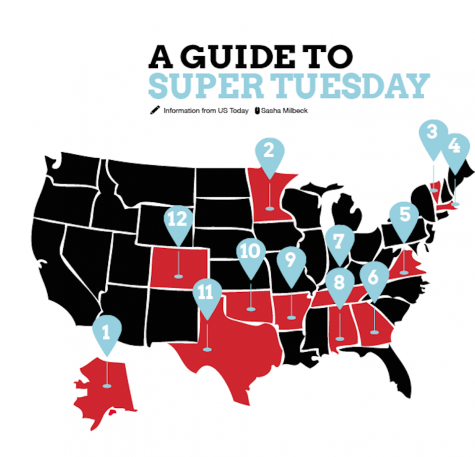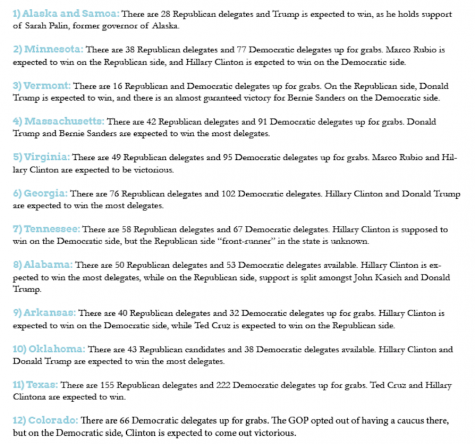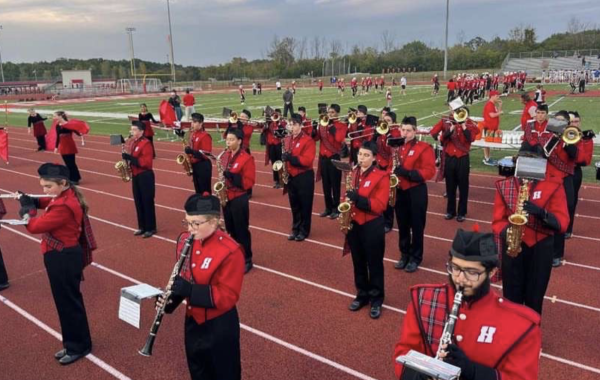Candidates compete for delegates on “Super Tuesday”


Super Tuesday is here- which begs the question- what is Super Tuesday?
Super Tuesday is considered the single largest voting day for both parties until November’s election, with ballots being cast in 13 states. According to Politico, Alabama, Alaska, Arkansas, Colorado, Georgia, Massachusetts, Minnesota, Oklahoma, Tennessee, Texas, Vermont, Virginia, Wyoming and American Samoa will cast their votes.
The voting process varies in each state. Both parties hold caucuses in the aforementioned states, but Republicans are also holding caucuses in Alaska and Wyoming, while Democrats are in American Samoa.
To win the nomination, a Republican candidate must earn 1,237 delegates out of the possible 2,472. And a Democratic candidate must win 2,383 out of the available 4,765. On Super Tuesday, there are 595 Republican and 1,1015 Democratic delegates up for grabs, which inevitably results in Super Tuesday being the most major primary of the election.
Thus far, both parties have had caucuses in Iowa, New Hampshire, Nevada and South Carolina. On the GOP side, the current delegate counts are: Donald Trump: 82, Ted Cruz: 17, Marco Rubio: 16, John Kasich: 6 and Ben Carson: 4. For the Democrats, Hillary Clinton has 91 delegates and Bernie Sanders has 65.
Part of the Super Tuesday primary, is referred to as the SEC primary, where southern states cast their votes. The inclusion of these southern states on Super Tuesday has changed the dynamics of each party. For example, Sen. Ted Cruz has referred to the SEC primary as his “firewall” and is aiming to win the support of conservatives and evangelicals, in particularly his “crown jewel” home state of Texas. On the Democratic side, former Secretary of State Hillary Clinton is hoping to gain high numbers of delegates in the Southern states, “thanks to [her] support among African Americans.”
Overall, the front-runners of each race: Donald Trump on the Republican Party, and Hillary Clinton on the Democratic Party, are expected to win the most delegates on Super Tuesday.
According to CBS, “while the polling varies by state, Trump and Clinton both look to be leading in a number of states across the map. For Republicans, Trump looks to be leading Virginia, Georgia, Oklahoma and Vermont, among others. As for Texas, Cruz leads in some polls while Trump leads in others, so it could be a very close race. On the Democratic side, Clinton leads in most states that will vote on Super Tuesday… She is up by double digits in all states, except Sanders’ home state of Vermont.”
The predictions of CBS were correct: Trump and Clinton ended up winning the most delegates. On the Republican side, Trump ended up winning seven states Cruz ended up winning four states and Marco Rubio won one state. After the primary, Trump now has 316 delegates, Cruz now has 226 delegates, Rubio has 106 delegates, Kasich now has 25 and Carson has eight.
On the Democratic side, Clinton won all of the states except four, which Sanders carried. Sanders ended up winning his home state of Vermont by a land-slide, and also the states of Colorado, Minnesota and Oklahoma. After the primaries, Clinton now has 1,001 delegates, almost half needed for nomination, and Sanders is behind with only 371.
The next primaries for both parties are on March 5, with three states voting in the Democratic caucuses, and four states voting in the Republican ones. According to CNBC, “Donald Trump may have walked away with a strengthened claim to the GOP domination, but both of his chief rivals notched wins that will most likely propel them onto the next series of contests.”

Sasha Milbeck is the senior Editor-in-Chief of Highlander Publications. Sasha is a self-diagnosed fontaholic and could spend all day in Room 405 if she...









